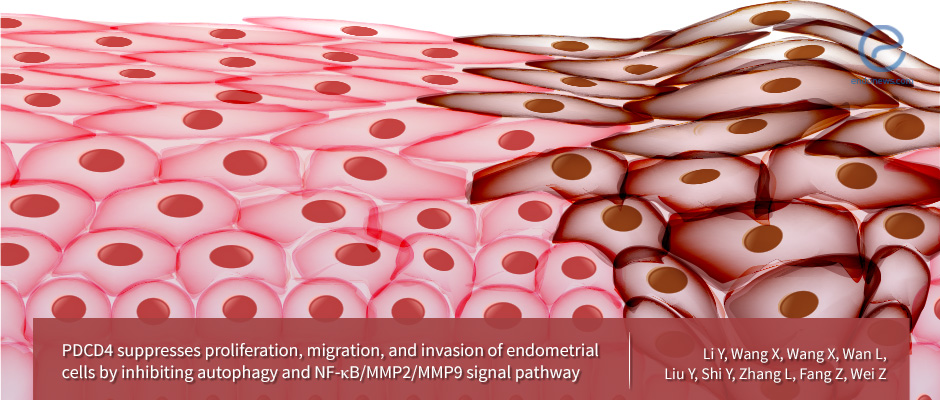Programmed cell death 4 suppresses endometriosis by inhibiting autophagy and NF-κB/MMP2/MMP9 signal pathway
Nov 7, 2018
Dr. Wei group revealed the role of PCDC4, a newly identified tumor suppressor, in the endometriosis.
Key Points
Highlight:
- The cellular and molecular characteristics of the eutopic endometrium in patients with endometriosis have not been fully elucidated.
- PDCD4, a tumor suppressor is highly downregulated in the eutopic endometrium and it affects numerous biological behaviors, suggesting a role in the endometriosis pathogenesis and provides a hope for a novel therapeutic approach.
Background:
- Endometriosis is a benign disease but shares many similar features with cancers, such as abnormal cell migration, invasion, and unrestrained growth.
- Some genes are expressed differentially in eutopic endometrium of endometriosis patients compared with control endometrium.
- PDCD4 is a novel tumor suppressor which plays important roles by inhibiting protein translation or activator protein-1 (AP-1) transactivation and transformation, as well as nuclear factor-κB (NF-κB)-dependent transcription. mRNA and protein levels are significantly downregulated in various human cancers including breast carcinoma and ovarian cancer.
Key points:
- PDCD4 mRNA and protein levels in the eutopic endometrium were significantly lower than those in control endometrium.
- PDCD4 suppressed the proliferation and colony-forming ability of endometrial cells.
- PDCD4 inhibited autophagy in endometrial cells by an autophagy-related marker, LC3B-II.
- PDCD4 inhibited the migration and invasion of endometrial cells by NF-κB/MMP2/MMP9 signal pathway.
- The results from transwell migration and invasion assay showed that PDCD4 could repress migration and invasion of endometrial cells and imply that the inhibitory effect of PDCD4 on the migration and invasion may be mediated by NF-κB/MMP2/MMP9 signaling pathway in endometrial cells.
Lay Summary
Endometriosis is a kind of benign disease but shares many similar features with cancers, such as abnormal cell migration, invasion, and unrestrained growth. It has been known that some genes are expressed differentially in eutopic endometrium of EM patients compared with control endometrium. However, the cellular and molecular characteristics of eutopic endometrium in patients with EM have not been fully elucidated. Recent studies show that PDCD4 is a novel tumor suppressor which plays important roles by inhibiting protein translation or activator protein-1 (AP-1) transactivation and transformation, as well as nuclear factor-κB (NF-κB)-dependent transcription. PDCD4 mRNA and protein are significantly downregulated in various human cancers including breast and ovarian cancer. Here, Dr. Wei group from China investigated for the first time the role of PDCD4 in the biological behaviors of endometrial cells.
Authors first examined the mRNA and protein level of PDCD4 in both eutopic and ectopic endometrium of endometriosis patients and found that PDCD4 mRNA and protein levels in the eutopic endometrium of EM patients were significantly lower than those in control endometrium. Also, PDCD4 re-expression suppressed the proliferation and colony-forming ability in PDCD4-low cells, but PDCD4 knockdown effectively decreased the expression of PDCD4 in PDCD4-high cell lines. In the previous study, the author found that PDCD4 inhibited autophagy in multiple cancer cells or murine xenograft model, and PDCD4-attenuated autophagy was required for inhibition of tumor cell growth. Here, in endometrial cells, they found that autophagy-related marker, LC3B-II, was significantly decreased by PDCD4 overexpression but increased by the PDCD4 knockdown.
Furthermore, the results from transwell migration and invasion assay showed that PDCD4 could repress migration and invasion of endometrial cells. In order to elucidate the mechanism by which PDCD4 inhibited the migration and invasion of endometrial cells, NF-κB/MMP2/MMP9 signal pathway which plays important roles in cell migration and invasion was analyzed. The level of P65, p-P65, MMP2, and MMP9 significantly regulated by PDCD4 and this implies that the inhibitory effect of PDCD4 on the migration and invasion may be mediated by NF-κB/MMP2/MMP9 signaling pathway in endometrial cells.
In conclusion, this is the first report to identify the involvement of PDCD4 in EM. This finding from Dr. Wei group provides a novel approach to target the aberrant PDCD4 expression in EM.
Research Source: https://www.ncbi.nlm.nih.gov/pubmed/29912279
Programmed cell death 4 (PDCD4) Endometriosis Proliferation Migration Invasion

